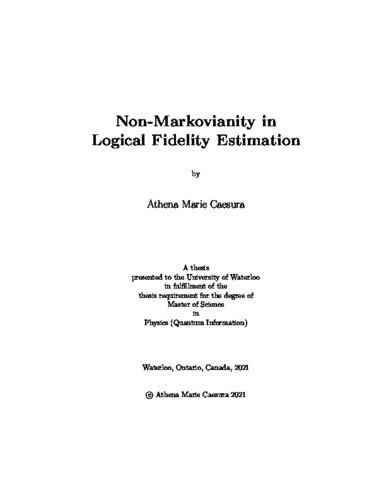| dc.contributor.author | Caesura, Athena | |
| dc.date.accessioned | 2021-02-26 21:02:42 (GMT) | |
| dc.date.available | 2021-02-26 21:02:42 (GMT) | |
| dc.date.issued | 2021-02-26 | |
| dc.date.submitted | 2021-02-24 | |
| dc.identifier.uri | http://hdl.handle.net/10012/16837 | |
| dc.description.abstract | As quantum devices are progressively scaled and refined, quantum codes will become indispensable to guarantee reliable computation in the presence of noise. Due to the difficulties of characterizing physical noise, direct measures of logical performance will be of paramount use to tune quantum codes [18]. Logical Randomized Benchmarking in [5] aimed to characterize the logical operations directly by performing randomized benchmarking using logical operators and following each operation with perfect QEC. However, due to resource limitations, physical implementations such as [14] only measure the syndrome at the end of a computation.
We develop a generalized framework for procedures that measure the fidelity of logical operations directly, logical fidelity estimation (LFE). We identify several freedoms that arise when attempting to define a fidelity which characterizes quantum error correction, specifically, in how error detection events are processed and in how often error correction is performed. We explore these freedoms by conducting a survey to eliminate inviable procedures guided by the presence of upticks, a standard signature of non-Markovianity [33]. Our survey highlights procedures that are robust to gate-dependent noise and procedures which are implementable in the near-term. We recommend applying post-selection after each gate as a benchmark for quantum codes which is robust to gate-dependent noise. We manage to eliminate some naive near-term protocols, but guaranteeing the robustness when QEC is applied at a at fixed time or when post-selection is applied at the end, are open problems. | en |
| dc.language.iso | en | en |
| dc.publisher | University of Waterloo | en |
| dc.relation.uri | https://github.com/mathmeetsmusic/Thesis_Numerics.git | en |
| dc.subject | Quantum Information | en |
| dc.subject | Randomized Benchmarking | en |
| dc.subject | Quantum Error Correction | en |
| dc.subject.lcsh | Quantum computing | en |
| dc.title | Non-Markovianity in Logical Fidelity Estimation | en |
| dc.type | Master Thesis | en |
| dc.pending | false | |
| uws-etd.degree.department | Physics and Astronomy | en |
| uws-etd.degree.discipline | Physics (Quantum Information) | en |
| uws-etd.degree.grantor | University of Waterloo | en |
| uws-etd.degree | Master of Science | en |
| uws-etd.embargo.terms | 0 | en |
| uws.contributor.advisor | Emerson, Joseph | |
| uws.contributor.advisor | Wallman, Joel | |
| uws.contributor.affiliation1 | Faculty of Science | en |
| uws.published.city | Waterloo | en |
| uws.published.country | Canada | en |
| uws.published.province | Ontario | en |
| uws.typeOfResource | Text | en |
| uws.peerReviewStatus | Unreviewed | en |
| uws.scholarLevel | Graduate | en |

